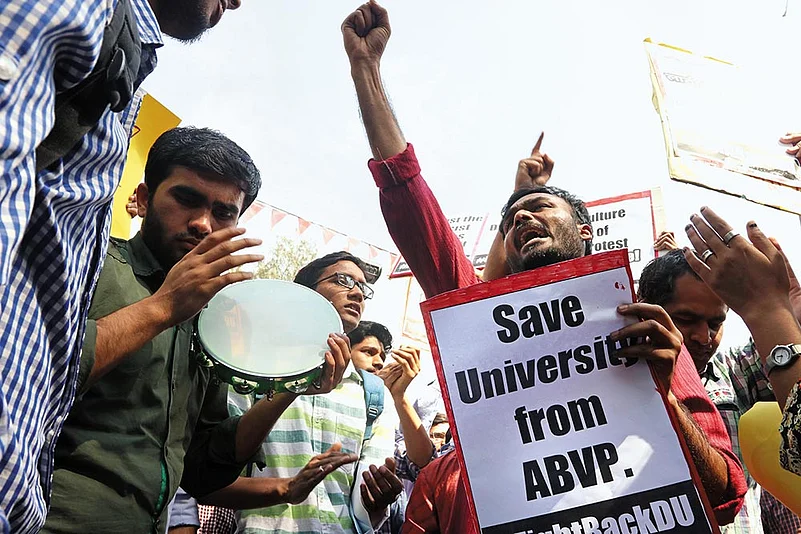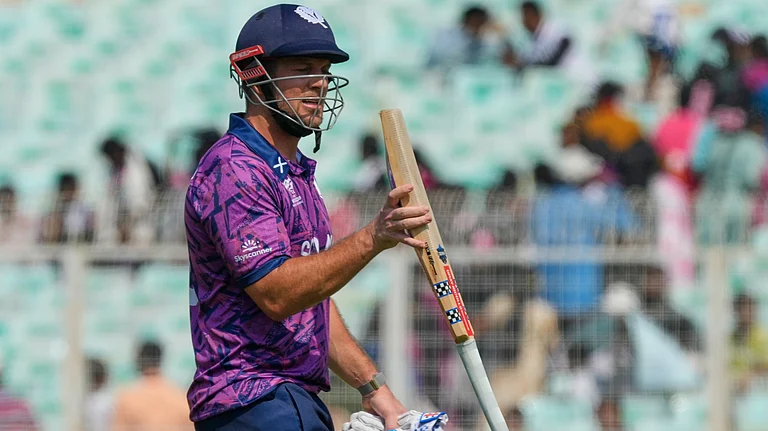Karl Marx, much maligned today, was not only a great scholar but also a fund of quotable quotes. Yet strangely, many of them, while intriguing, didn’t quite fit India. History, he once said, repeats itself twice, once as a tragedy, then as a farce. History in India does repeat itself, but in a more slapstick way, first as a farce and then as a tragic farce. One senses this in the current battle of the university.
The first round at JNU and Hyderabad had drama, but the academe’s resistance was eventually sucked out by the bureaucracy. The battle over Ramjas College, billed as round two, is more worrying and can be read at three levels: a battle between two student groups, which has shades of a Punch and Judy show; the public and, one might add, Facebook perception of the demonstrations that followed; and then the overall question of the university’s fate.
Let us begin in the middle. At one level, what one confronted was violence. The RSS, ever since the BJP came to power, has played a happy bully boy at the university. Its violence has been brutal. What is worse, women have brutally attacked women. The barbaric way in which Shehla Rashid was treated, literally being dragged by the hair, signalled the barbarity of the attacks. The SFI too, the bully boy of many a movement in the past, cannot play innocent either. The immediacy of violence makes these events sound like a battle between two parties and their student wings. But the question is does the battle of Right and Left exhaust the political space of the university. More fundamentally, are we watching a battle of the parties or are we witnessing the crisis of the university?
The university as an institution differs in its grammar from the party. The university is a place of debate, a home for controversy, pluralism and rituals of violence. One has to go beyond the standard opposition and ask whether there are forces in the university that can mediate the battle, emphasising the primacy of the university as a value frame over the party. This means one challenges the current violence on the campus. This also involves challenging the terms of debate that lead to violence. The idea of patriotism cannot be the defining officialdom of a university. A university, by definition, allows for dissent, even for the rumour of sedition. Academics and intellectuals do not have to parade in uniform or mouth official concepts. Violence cannot be the response to dissent nor can a partisan state pretend to play referee.
I remember a debate about three decades ago around the writing of history books. There was a debate where Left, Right and liberals were all invited to a daylong seminar at the Delhi School of Economics, where characters as different as Sumit Sarkar, Subramanian Swamy and Ashis Nandy spoke, each providing a different angle to the debate. The crowd was partisan, but it had the ability to listen, to debate. No speaker was threatened, no group given preferential times. It was part battle, but more of a festival of ideas, where students understood that the state could not be the repository or referee of historical truth.
More importantly, there was a sense that the university allowed for a theatre of differences, and the debate continued in the cafes for weeks after. There was no sense of fear and, in fact, a certain common pride in the maturity of debate and the autonomy of the university. Many respected professors and scholars attended the debate. One saw the university taking its function, its vision of pluralism seriously, playfully and democratically. It was a beautiful and dramatic moment.
Today, one misses the comradeship and carmaderie of ideas. I am not blaming the Right or the Left, but I sense both see the university as text, providing a pretext for other debates. Violence seems to substitute for a celebration of debate and the university, which has an aesthetics of disorder to underwrite its plurality, is becoming a pure law-and-order problem. At that moment, the vice-chancellor abdicates his role, becoming a party minion. Worse, the police either play indifferent spectators or act as judges deciding who are the guilty.
I think it is time the university reasserts itself as an institution, accepting a certain accountability for its performance. This requires courage, including telling the RSS that tampering with the syllabus is as vile as tampering with the Constitution. The university must challenge majortarianism and violence in any form and keep values alive. Violence emasculates the values of the university, allowing ideologues and populist groups to take over. A reassertion of the idea and the ideal of the university must be at the centre for any attempt to respond to the Ramjas event as a fable of the crisis of the university.
(The writer is a social science nomad.)
























